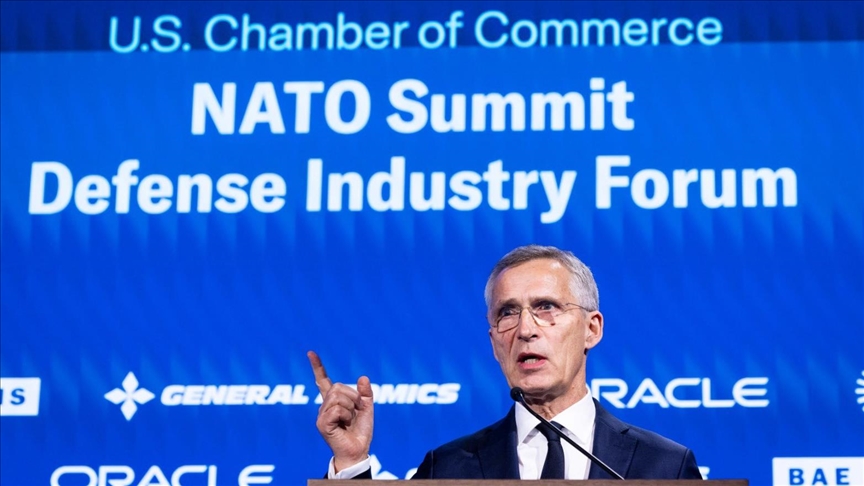

By Anadolu Agency
WASHINGTON
NATO’s goal for member states to spend 2% of their gross domestic product on defense is now a minimum figure, Jens Stoltenberg said Tuesday as one-quarter of allies have failed to reach the guideline.
Addressing defense industry leaders as the Transatlantic alliance begins its three-day summit, the outgoing head of the alliance said the 2% goal “is no longer some kind of ceiling, but 2% is now the floor for our defense spending.”
“It’s not good enough, what we do now. We will do more. So, there is a good market outlook for you, because defense spending will continue to increase and they will continue to invest in things you are delivering,” Stoltenberg told industry leaders at the US Chamber of Commerce.
Just 23 of NATO’s 32 members have hit or surpassed the target, according to the alliance’s official information.
A new NATO pledge that will be signed this week will improve existing innovation and production across allies’ defense industrial bases, said Stoltenberg.
The effort “will help to make our industry across Europe and North America stronger, more innovative and capable of producing at scale,” he said.
In addition to agreeing on spending more on defense, the agreement will focus on ensuring allies “spend better by spending more together, and that’s partly to ensure that we are able to actually sign the big contracts for the long term, and also partly to ensure that we are able to utilize the economy of scale, working together with the defense industry.”
The US mission to NATO circulated a fact sheet on parts of the pledge that will include a series of partnerships between key NATO nation defense contractors, including Northrup Grumman, Airbus, Lockheed Martin, BAE Systems and Diehl Defense. Co-development, production and sustainment on a series of weapons systems, including Patriot batteries, the F-35 and other key NATO weapons systems, will also be part of the agreement.
Four multilateral signing ceremonies have already taken place, including two with the participation of Türkiye. Those include the Alliance Persistent Surveillance from Space program, which the US mission said is the “largest multinational investment in space-based capabilities in NATO’s history. The agreement includes 17 NATO allies.
A separate allied software for cloud and edge services includes 22 allies and will “revolutionize Allied operation by providing key building blocks of the Alliance-wide Digital Backbone.”
Two other agreements concern the use of allied airspace and a nearly $700 million Stinger missile contract that will provide allies with 940 missiles.
We use cookies on our website to give you a better experience, improve performance, and for analytics. For more information, please see our Cookie Policy By clicking “Accept” you agree to our use of cookies.
Read More